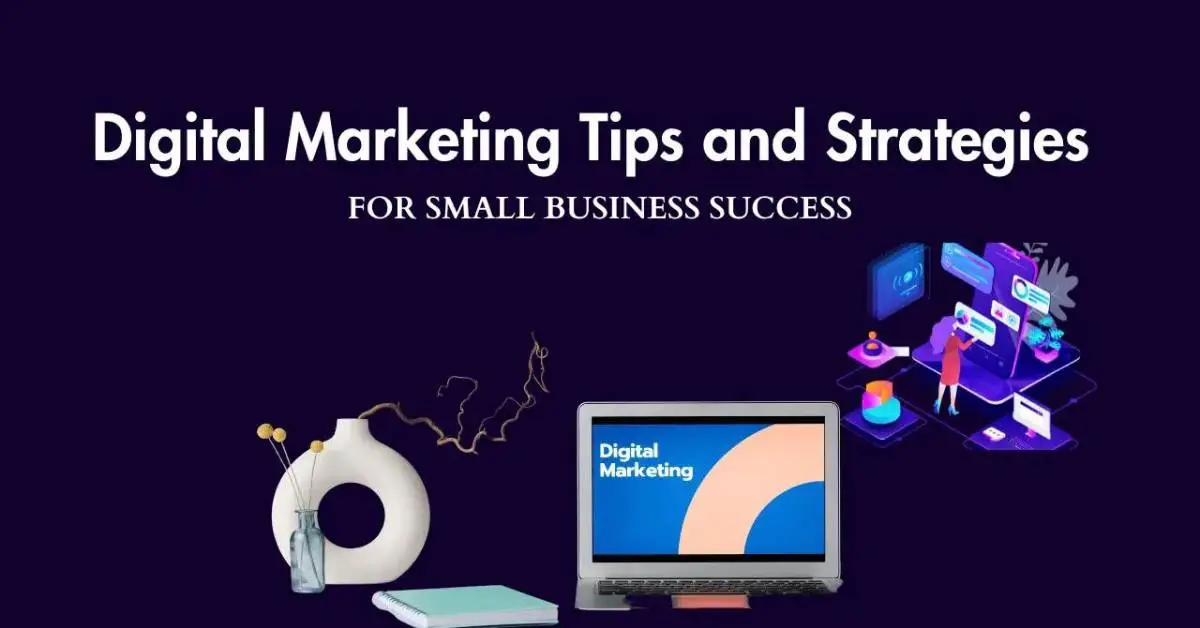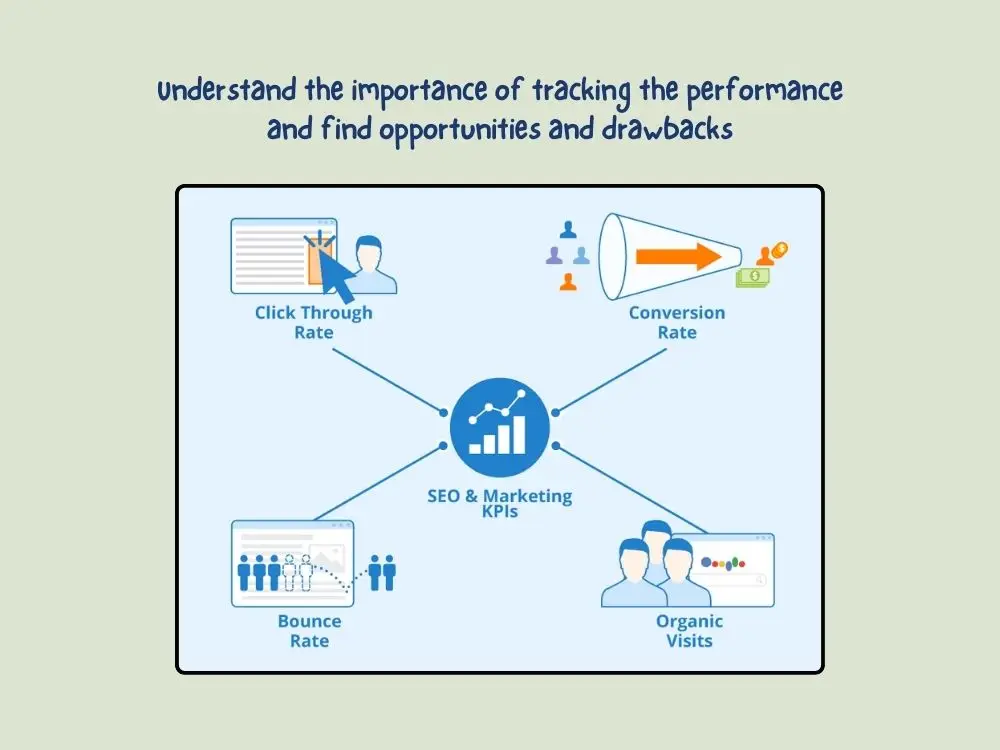
Unlocking the Power of Digital Marketing: Tips and Strategies for Small Business Success
Why do some businesses succeed online, while others fail to get noticed? The answer is digital marketing, which offers businesses like yours an opportunity to compete and win in a crowded marketplace. This includes all the strategies to market an almost endless number of products and services through the digital channel.
Digital marketing involves practices like email marketing, social media marketing, search engine optimization (SEO), online ads, etc. By utilizing a variety of practices, businesses can target and actually reach out to potential customers.
Key Takeaways
- Understand the importance of digital marketing for small businesses and its role in connecting with the target audience.
- Learn effective strategies for identifying and engaging with your target audience.
- Explore methods to build a strong brand presence online through social media and engaging content.
- Discover the power of email marketing and social media advertising in promoting your business.
- Recognize the importance of tracking and analyzing digital marketing efforts to optimize strategies and improve results.
Importance of Digital Marketing for Small Businesses
Having a strong online presence is crucial nowadays. You can't expand your business without having this necessary setup. Digital marketing provides effective insights to connect with your target audience, and it helps effectively compete against big companies in the industrial market.
It allows you to leverage social media, email marketing, and search engine optimization (SEO) to engage with your target customers actively. It also empowers small businesses to monitor and evaluate their marketing initiatives. It provides valuable insights to refine their campaigns and increase their return on investment.
Overall, it plays an inevitable role that helps small businesses establish a robust online presence and foster sustainable growth in their operations in the long run.
Understanding Your Target Audience

Importance of Identifying Your Target Audience
The key to your business success lies in truly understanding your consumer preferences. It shapes the course of your content, messaging, and marketing endeavors. It would help if you gained a comprehensive understanding of your target audience's interests, demographics, and preferences.
This will help you create compelling content that resonates with them on a personal level and addresses their specific needs. If you ignore the fact of identifying your target audience, it may result in a decline in performance and a shortage of engagement.
Therefore, it's necessary to dedicate some time and effort to thoroughly studying your audience. This ensures that your content aligns with their needs and effectively captivates their attention.
How to Understand The Needs and Interests of Your Audience
To understand this, you should do thorough market research. It may include the customer demographics and behavioral patterns. Always try to engage with your audience through taking surveys, feedback, and active social media interactions to gain important insights into their preferences and expectations.
Keep an eye on the topics that generate high levels of engagement from the customers. By following all of these methods, you can easily find out your target customers' needs and expectations. This will help you match the demand according to their requirements.
Building a Strong Brand Presence Online

Importance of Building a Strong Brand Online
By building a strong online brand, small businesses can set themselves apart from their competitors and enhance their credibility and trustworthiness. Nowadays, customers are more likely to do their online research before engaging with a brand.
Therefore, having a robust online presence enables small businesses to reach their target audience effectively. A strong online brand aids in increasing customer loyalty and repeat business. This leads to continuous growth for small businesses.
How to Create a Brand Presence on Social Media Platforms
It involves actively engaging with various social media channels to raise awareness about your unique brand. To begin, you should define the brand identity through these platforms, which will enable you to reap several benefits.
By consistently sharing relevant content on social media, you can provide valuable insights to your customers about your brand. Also, analyzing social media metrics becomes paramount to gauging audience interest in specific products or services. These are some essential ways to build your brand presence on social media
Creating Engaging Content

Why Content is Essential for Digital Marketing
Content is undoubtedly the base for a successful marketing campaign, and it's considered the backbone of online activities. Without good content, it will be tough to attract and engage the target audience, build brand awareness, and generate leads.
Moreover, well-established content helps you rank in search engine result pages (SERP), which drives more organic traffic to the business's website. In brief, small businesses should focus on creating high-quality content to increase their visibility.
Types of Content That Are Effective for Small Businesses
Crafting compelling digital content presents a common challenge for small businesses seeking to distinguish themselves from their competitors. However, there exist various content types that can enhance their online visibility and facilitate connections with their target audience.
Among these, blog posts are a popular choice that allow businesses to create informative articles that showcase their expertise and deliver value to their readers. Social media platforms offer another effective path that enables small businesses to craft engaging posts and share captivating visuals and videos. This helps them actively engage with followers to cultivate a loyal community.
Additionally, webinars, video tutorials, and AI-generated videos are excellent tools for showcasing products or services while providing valuable educational content for the audience. By skillfully employing a blend of these content types, small businesses can drive increased traffic to their website, fortify their brand, and ultimately increase their revenue streams.
Leveraging the Power of Email Marketing

Importance of Email Marketing
Nowadays, the importance of email marketing is inevitable. Small businesses use the power of email marketing to actively engage and communicate with their potential customers. Also, they can anticipate good results for every investment they make in email marketing.
By implementing this email marketing strategy, small businesses gain a direct attachment with their target customers. This attachment strengthens their brand and achieves superior returns on their investments by increasing leads or closing more sales deals.
How to Build an Email List
To start building your email list, it's essential to create a user-friendly sign-up form on your website that will allow visitors to provide their email addresses. To entice them further, consider giving them freebies like e-books or gifts commonly known as lead magnets. Once you have email subscribers, you must deliver engaging content that grabs their attention.
This can be a well-crafted newsletter, promotional email, or carefully curated content. Finally, consistency is key, where regular email communication ensures that your subscribers remain engaged and don't forget about your business.
By implementing these strategies, you'll have a good email list that contributes to the growth and success of your business. Plus, it's always better to validate the email addresses of your customers to make the email marketing campaign successful.
Utilizing Social Media Advertising

What is Social Media Advertising
Small businesses focus on connecting with their target customers using different social media channels such as Facebook, Twitter, Reddit, LinkedIn, and many more. So, they harness the power of these important platforms to connect and engage with their target customers.
This helps create brand awareness and promote their products/services. Mainly, social media advertising involves paid campaign methods where businesses need to invest some money to run paid advertisement campaigns to promote their product or services.
Here, they consider their target customers, their geographical location, interests, gender, age, and many other factors. The investment is worth trying, where getting customers and raising brand awareness are significant when it comes to digital marketing.
How to Set Up and Run Social Media Ads
There are several steps to follow to set up and run social media ads to achieve success. Firstly, small businesses should understand their target audience and determine the social media platforms they actively engage with.
Second, they need to establish campaign objectives and set a suitable budget. Subsequently, creating appealing ad content will captivate the target audience. Once the ads are live, it's important to pay close attention to monitoring their performance and make necessary adjustments for optimization.
Additionally, it's salient to remember that social media ads hold significant potential for promoting your business, but it's vital to approach them strategically and with a well-defined plan in place.
Tracking and Improving Results

Importance of Tracking Digital Marketing Results
Tracking digital marketing results is very important for many reasons. Without a proper tracking system, it's impossible to identify the profitability and effectiveness of the efforts invested. Whether it entails measuring click-through rates (CTR) or conversion rates, tracking is necessary to determine which strategies yield desirable outcomes and what requires adjustment.
By gathering all data, analyzing the campaigns, and making informed adjustments, small businesses can able to optimize their digital marketing strategies. Plus, they extract good value for their investments.
Tracking digital marketing results will not only enable small businesses to maximize their return on investment but also furnish valuable insights into customer behavior that allow them to remain ahead of the competition.
Tips for Measuring and Analyzing Digital Marketing Efforts
It's important to have a strong understanding of how to measure and analyze your efforts. To do so, you have to set a certain number of specific goals and key performance indicators (KPIs) that align with your overall business objectives.
Using tools like Google Analytics, social media analytics, and email marketing metrics will provide adequate insights into the performance of your campaigns.
Regularly reviewing and analyzing this data can help you adjust your strategies and optimize your approach for maximum efficiency. Also, it's really important to stay up-to-date with industry trends and changes to make sure digital marketing efforts remain effective.
Final Thoughts
Small businesses understand the importance of harnessing the potential of digital marketing to compete with larger enterprises. A well-planned digital marketing strategy helps you attract and retain new customers, boost revenue, and enhance brand awareness.
To stand and succeed in the digital marketing field, businesses must possess adequate knowledge about their target market and customize their strategies accordingly. Further, leveraging diverse smart digital tools can help effectively reach the target audience.
FAQs
Q1: What are the digital marketing benefits?
There are many benefits to small businesses such as growing the business online, helping businesses save money while connecting with the target audience, increasing brand recognition, and adjusting strategies to get better results.
Q2: How do I start digital marketing?
To begin, it's vital to comprehend your target audience, create compelling content that people find interesting, use social media and email marketing, and finally analyze your results to improve.
Q3: What is the job role of digital marketing?
In digital marketing, here are some common job roles that need attention:
- Managing Digital Marketing
- Handling Social Media
- Creating Content
- Optimizing Search Engines
- Running Email Marketing
Q4: Does digital marketing work for small businesses?
Yes, digital marketing is good for small businesses. It's a cost-effective way to connect with your audience, boost brand recognition, and help small businesses grow.
Explore Related Posts
https://smarttoolsai.com/post/the-4ps-of-marketing-game-changer-for-your-business-success
https://smarttoolsai.com/post/ip-addresses-and-geolocation-for-customer-targeting
.webp)